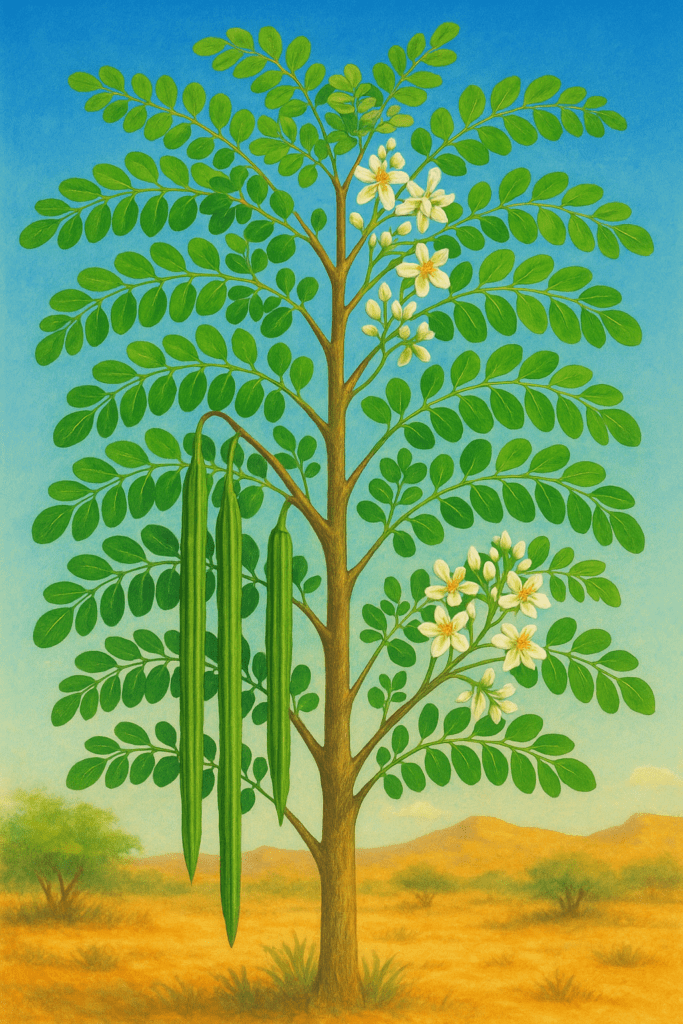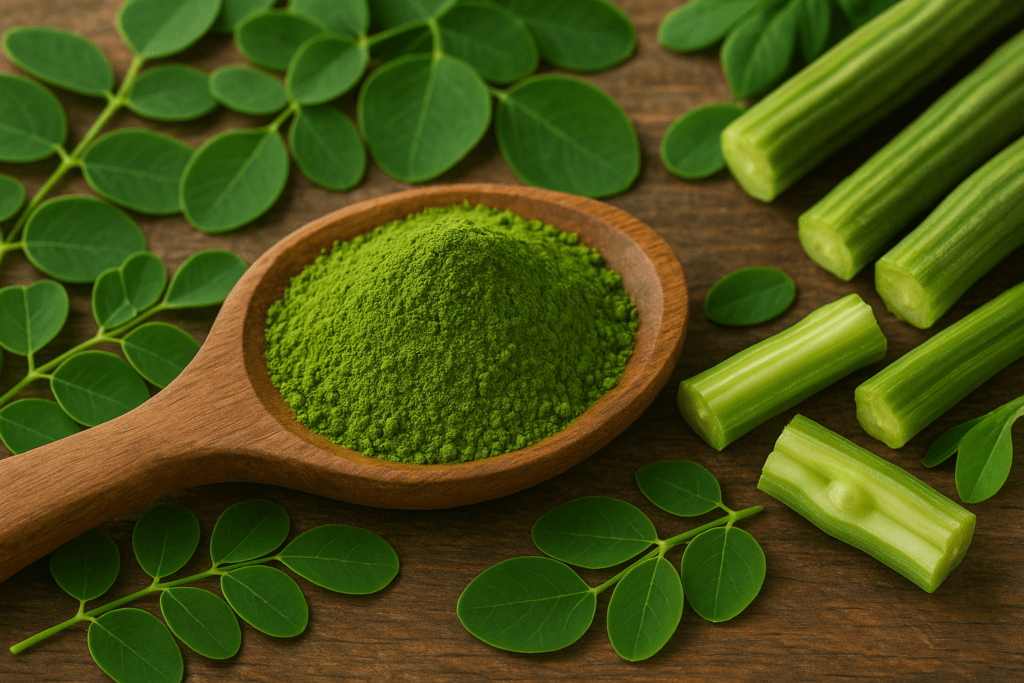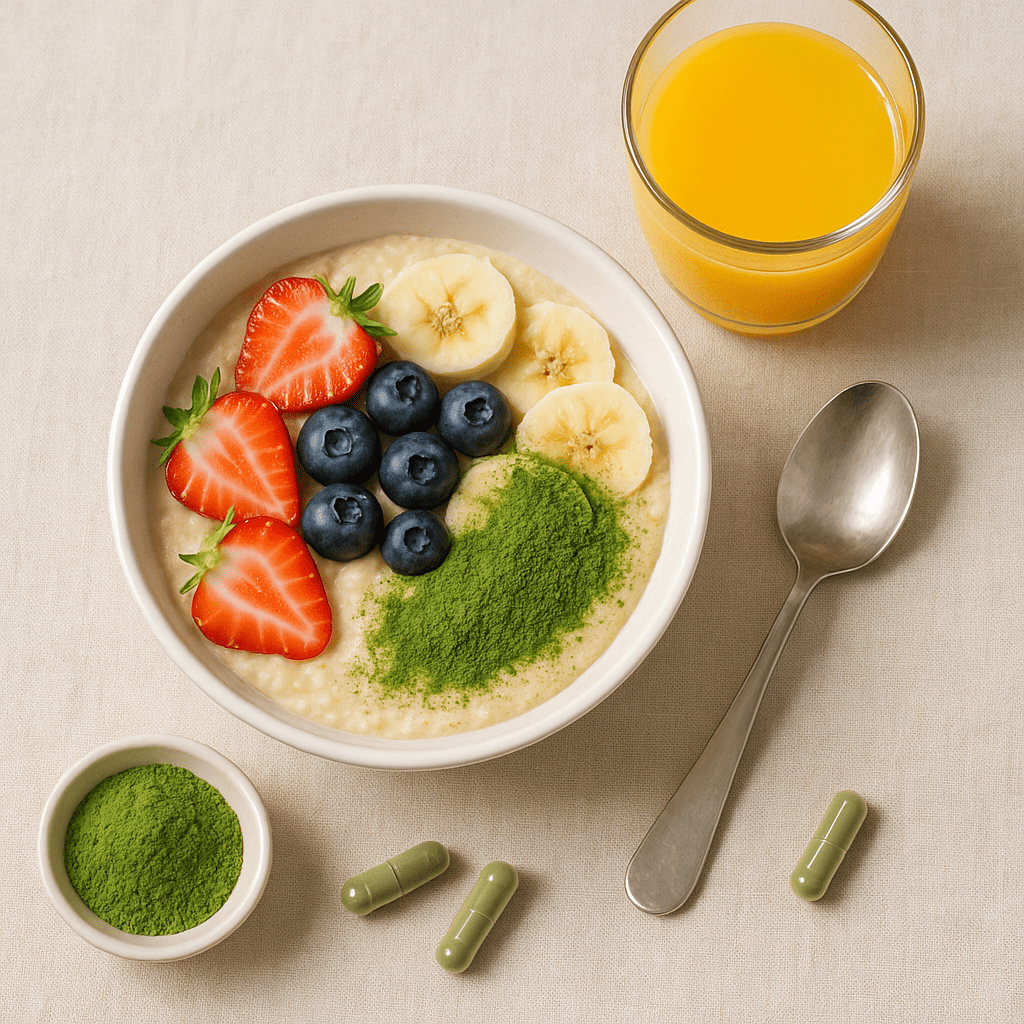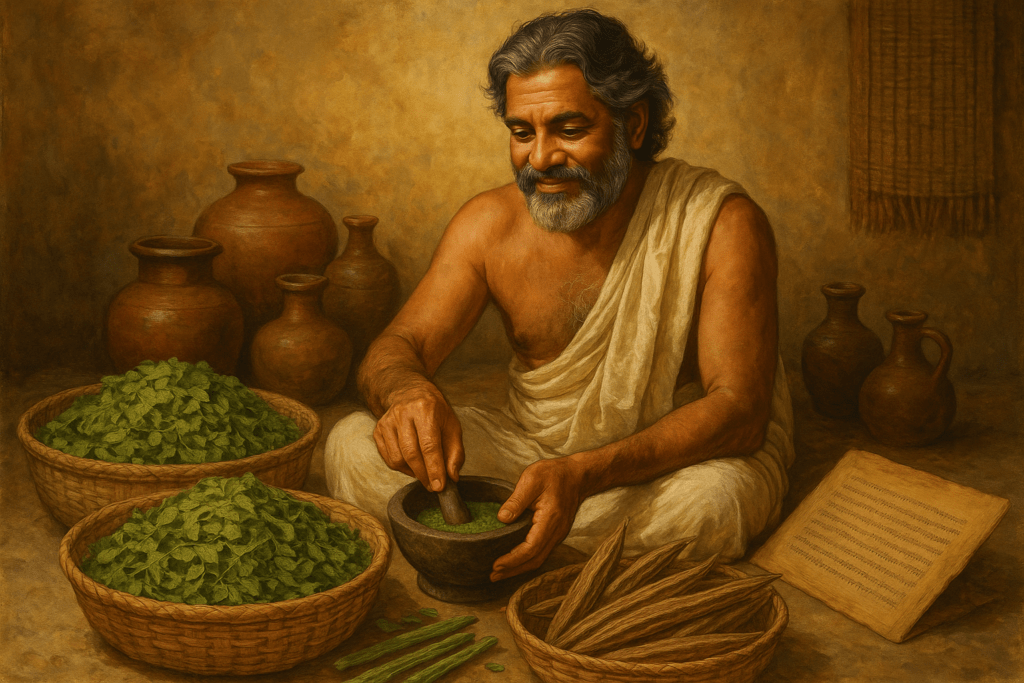Moringa oleifera, often referred to as the “miracle tree” or “miracle tree,” is a plant that has been rapidly growing in popularity around the world. Native to India and parts of Africa, this plant is renowned for its exceptional nutritional value and potential health benefits. Although moringa has been used in traditional medicine for thousands of years, modern scientists are just beginning to uncover its potential benefits to the human body. Scientific research supports some of the traditional claims about moringa’s benefits, while others require further research.
In this article, we will discuss what moringa is, its nutritional properties, research-backed health benefits, how to use it, and potential side effects. You will learn about moringa’s place in traditional and modern medicine, and how to safely incorporate it into your diet.
What is moringa?
Moringa oleifera is a fast-growing tree that belongs to the Moringaceae family. It is most common in India, Africa and Asia, but due to its drought tolerance and nutritional properties it is now cultivated in many tropical and subtropical regions around the world. The tree can grow up to 10-12 meters tall and is distinguished by the fact that almost all its parts – leaves, pods (pods), seeds, flowers, bark and roots – are used for food or in traditional medicine.

Moringa is commonly found in several forms on the market today. The most popular form is moringa leaf powder, which is made by drying and grinding the leaves. Moringa is also available in capsules, tea, seed oil, and even fresh leaves or pods, depending on where you live. Its versatility and nutritional properties have made it a popular ingredient in dietary supplements and natural medicine.

Scientifically Proven Benefits of Moringa
While moringa has been used in traditional medicine to treat a variety of ailments, scientific research is still evaluating its potential. Some of its beneficial properties have already been confirmed by scientific studies, but many still require more in-depth human studies. Let’s take a look at the scientifically proven benefits of moringa.
Natural Antioxidants
Moringa leaves naturally contain compounds such as quercetin, chlorogenic acid, beta-carotene, and vitamin C. These substances help protect cells from oxidative stress. Antioxidants are important for the body’s daily defense against environmental aggressors.
Beneficial Nutrients
Moringa is a source of vitamins A, C, E, iron, calcium, and zinc – all of which are important for the normal function of the immune system, skin health, energy metabolism, and red blood cell formation.
Traditional Uses
In many countries, moringa is consumed as part of a balanced diet. It is included in the daily diet in the form of powder or capsules, especially appreciated by people with active lifestyles.
Natural composition
Our moringa products are made from carefully processed moringa leaves, without synthetic additives or preservatives.
Nutrition: what makes moringa a great supplement?
Moringa is a real source of nutrients. The leaves of this plant are particularly distinguished by their nutritional value and contain an impressive amount of vitamins, minerals, antioxidants and other beneficial compounds needed by the body.
Gram for gram, fresh moringa leaves contain 7 times more vitamin C than oranges, 4 times more vitamin A than carrots, 4 times more calcium than milk, 3 times more potassium than bananas and 2 times more protein than yogurt. The concentration in moringa powder is even higher, because when drying the leaves, water is lost, but the nutrients are retained.

Here’s what the nutritional value of 10 grams (about 1 tablespoon) of moringa leaf powder looks like:
- Calories: about 30
- Protein: 2-3 g
- Fiber: 1-2 g
- Vitamin A: 150% RDI (recommended daily intake)
- Vitamin C: 15-20% RDI
- Calcium: 8-10% RDI
- Iron: 10-12% RDI
- Magnesium: 8-10% RDI
Moringa is also rich in all nine essential amino acids, making it a unique plant-based protein alternative. It’s also rich in antioxidants like quercetin, chlorogenic acid, beta-carotene, and vitamin C, which help fight free radicals and prevent cell damage.
It’s important to note that the nutritional composition of moringa can vary slightly depending on soil conditions, harvest time, and processing methods. The quality of dietary supplements can also vary greatly, so it is always worth choosing reliable manufacturers.
Moringa Uses: Culinary, Supplement, and Wellness
Moringa is a versatile plant that can be incorporated into your diet in a variety of ways. From culinary to supplement, its uses are wide and varied, allowing everyone to find the method that works best for them.
Moringa leaf powder is the most popular and easily accessible product. It can be mixed into smoothies, yogurt, or porridge, sprinkled on soups or salads, or even added to dough when baking bread or other baked goods. The powder has a fairly strong flavor, which some compare to spinach or matcha tea, so it is recommended to use a small amount at first – about half a teaspoon per day, gradually increasing to 1-2 teaspoons.
Moringa tea is another popular option.

It can be purchased in sachets or made from dried leaves. Moringa tea has a mild herbal flavor and is a great way to get the benefits of moringa without the strong taste.
Fresh moringa leaves can be used in a similar way to spinach or other leafy greens – boiled, steamed, or eaten raw in salads. Fresh moringa pods (drumsticks) are a popular ingredient in South Asian cuisine and can be boiled, fried, or steamed like other vegetables.
Moringa oil, obtained from the seeds, is most commonly used externally for hair and skin care.

It can be used as a moisturizer, hair mask, or massage oil. Some studies suggest that moringa oil may help reduce skin inflammation, fight acne, and slow the signs of aging.
Moringa capsules are the most convenient way to get a concentrated dose, especially for those who don’t like the herbal taste of moringa. However, it’s important to choose quality capsules from reputable manufacturers and follow the recommended dosage.
When it comes to dosage, there are no hard and fast guidelines, but most studies have used 500-2,000 mg of moringa per day. It’s always a good idea to consult a healthcare professional before starting any supplement, including moringa, especially if you have a medical condition or are taking medications.
Moringa Side Effects, Risks, and Interactions
While moringa is generally considered safe for most people, especially when consumed in food amounts, it is important to be aware of potential side effects and drug interactions.
Moringa leaves and pods are considered the safest parts of the plant. However, moringa may cause digestive upset, such as nausea, diarrhea, or flatulence, in some people, especially when consumed in large doses. For those new to using moringa, it is recommended to start with small amounts and observe how your body responds.
Moringa roots and bark carry a higher risk of side effects and are generally not recommended for daily use. They contain alkaloids that can be toxic in large doses. Additionally, some studies suggest that moringa roots may have abortifacient properties.
Pregnant and nursing women are advised to be especially cautious with moringa. While moringa is nutritious and may have benefits, there is limited research proving its safety during pregnancy and breastfeeding. Some traditional sources claim that moringa can stimulate milk production, but this claim has not been scientifically proven. Due to the potential effects of the roots and bark, pregnant women should avoid any form of moringa unless otherwise directed by their healthcare professional.
Moringa may also interact with some medications. Because it can lower blood sugar levels, there may be a risk of hypoglycemia (low blood sugar) when taken with diabetes medications. Similarly, because of its potential effects on blood pressure, moringa may enhance the effects of antihypertensive medications.
Additionally, moringa may act as a weak immune booster, which may be a problem for people taking immunosuppressive medications. It may also interact with thyroid medications due to its effects on thyroid function.
It is recommended to avoid taking more than 70 grams of moringa leaves per day, as this may cause toxic reactions. Normal doses used in most studies are usually between 500 mg and 2,000 mg per day.
As with any dietary supplement, it is very important to consult your doctor before taking moringa, especially if you have any medical conditions or are taking medications.
Moringa in Traditional and Modern Medicine
Moringa has deep roots in traditional medicine, especially in Ayurveda, the oldest known system of medicine, originating in India. In Ayurvedic terms, moringa has been used to treat over 300 diseases and for general health.

The plant was particularly valued for its anti-inflammatory properties and ability to support the immune system.
In traditional African medicine, moringa was used to treat anemia, arthritis, rheumatic and joint pain, as well as various infectious diseases. Its leaves and seeds were applied externally to treat wounds, skin infections, and reduce inflammation.
In many cultures, moringa was particularly important for women’s health. It was used to strengthen the body after childbirth, to stimulate milk production in nursing mothers, and to relieve menstrual pain. Moringa seeds were also used to purify water and as a natural antibiotic.
In modern medicine, moringa is gaining increasing attention as a potential alternative treatment for various diseases. Scientists are actively investigating its benefits in the treatment of diabetes, cardiovascular disease, cancer, arthritis, and other chronic diseases. Clinical trials have confirmed some of moringa’s traditional uses, such as its ability to reduce inflammation and regulate blood sugar levels.
Modern pharmaceutical research has also revealed that moringa contains many bioactive compounds, such as isothiocyanates, flavonoids, and phenols, which may have therapeutic effects. Some scientists are even exploring the possibility of using moringa as a natural source of antibiotics, given the increasing resistance to antibiotics.
One interesting aspect is the potential of moringa to address nutritional problems in developing countries. Due to its drought tolerance and nutritional value, moringa could be a valuable food source in regions where malnutrition or hunger are a problem. Organizations such as Trees for Life and ECHO are actively promoting the cultivation of moringa as a sustainable solution to combat malnutrition.
Although moringa has promising properties, more scientific research is still needed to fully understand its potential and determine optimal methods of use. Modern medicine is increasingly recognizing the knowledge of traditional medicine, and moringa is a great example of how the wisdom of the ancients can help solve modern health problems.
Conclusions
Moringa is truly an impressive storehouse of nutrients with promising therapeutic potential. Its leaves, pods, and other parts offer a variety of nutrients, including vitamins, minerals, antioxidants, and essential amino acids, earning it its reputation as a superfood.
Scientific research is increasingly supporting traditional knowledge about moringa’s health benefits, especially its antioxidant properties, effects on blood sugar, and cholesterol. However, it’s important to recognize that many of the claims about its benefits still require extensive clinical trials.
As with any dietary supplement, moderation is key. While moringa is safe for most people when consumed in food amounts, high doses may cause side effects. Additionally, individuals taking medications, those with chronic medical conditions, or pregnant women should consult a healthcare professional before taking moringa supplements.
When choosing moringa products, it’s important to look for quality, certified sources to ensure the purity and safety of the product. It is worth looking for third-party certifications such as USDA organic, non-GMO, or GMP, which can help ensure quality.
In conclusion, moringa is a valuable source of nutrients and has potential as a complementary health tool. With a careful and informed approach, it can be beneficial to health, supporting overall health and potentially helping to manage certain health conditions. As always, the best approach to health is a holistic one that includes a balanced diet, regular physical activity, and, when necessary, professional advice from a healthcare professional.
Frequently Asked Questions
Is it safe to take moringa daily?
In moderate amounts, moringa leaves are generally safe for most people. As a dietary supplement, follow product directions and the advice of a healthcare professional, as high doses may cause adverse effects.
Can moringa help you lose weight?
Animal studies suggest that moringa may affect fat metabolism, but there are no strong human studies to support a significant effect of moringa on weight loss.
Who should avoid moringa?
Pregnant or breastfeeding women, as well as those taking medications for blood sugar, blood pressure, or thyroid conditions, should consult a doctor before taking moringa.
What is the best way to take moringa?
Moringa can be consumed as a tea, powdered into smoothies or meals, or by eating the cooked leaves/pods. Start small and see how your body reacts.
Does moringa oil have proven cosmetic benefits?
Moringa oil is rich in antioxidants and fatty acids that help moisturize the skin and potentially have anti-aging properties, but most of the evidence comes from traditional use and early research.
